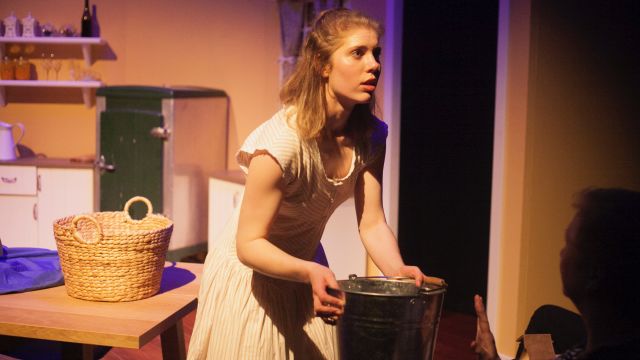Happy Days at War
Happy Days at War depicts a young German couple ‘F’ (playwright Leah Milburn-Clark) and ‘M’ (co-director Jay Peardon) in 1939 Germany - that is, Germany with the National Socialists in power and on the brink of war. M is a devout Nazi, who gets a job on Hitler’s staff, and a virulent anti-Semite. He makes such statements as, ‘the air is cleaner now the Jews are gone.’ F protests ineffectually against such statements, but the couple are, nevertheless, happy and in love.
However, F is blind and the play turns on the irony of the Nazi decree that, as well as Jews, any person disabled (mentally or physically) is sub-human and must be eliminated to prevent them ‘breeding’ and polluting the pure, Aryan Reich. What will M do? Turn F in – hide her, or flee with her?
Ms Milburn-Clark has clearly researched and closely observed blind people; her performance as a blind woman is detailed and convincing. Mr Peardon, meanwhile, gives us a tight, blinkered fellow who is, all the same, sentimental about his little blind wife – until she becomes a threat to him. But the decision for both characters to speak their English lines with ‘German’ accents is, as usually happens, dubious. While Ms Milburn-Clark is relatively clear, about half of Mr Peardon’s dialogue, especially when he speaks in a conversational tone, is rather difficult to comprehend.

Since the program pretty much gives away the plot when it clearly states ‘the husband must declare any affiliation with Jews or people with disabilities or impairments’, the audience has the reasonable expectation that this Nazi decree will be where the story really begins. Unfortunately, it does not happen until well over half way, the preceding scenes illustrating M’s vehement racist ideology but mostly the couple’s (rather cloying) happiness together – although some German dance music of the time, and the couple’s dancing to it (choreography by Alexander Perrozzi) is charming.
Nicola Stratman’s set of a German kitchen is very detailed – in some respects, naturalistic, in others not. A very long table divides the audience from the playing space, although audience members in the front row are asked to hold significant props until needed. (The reason for this is that Ms Milburn-Clark describes her show as ‘immersive theatre’.) There is a sink and a tap, but whenever water is needed, it’s in an ewer. F does some ironing with an electric iron but one that she heats on the stove and with no protection for the bare wood of the kitchen table.
Overall, there are just too many props for the actors to handle in the play’s series of brief scenes: for instance, a scene in which F shows her anger with M and the world by punching and scattering flour she has tipped onto the table to make bread. There’s then a hiatus while M cleans up. Simple stagecraft errors like this mar the story. There are virtually no sustained scenes. Instead there are many brief scenes, with a fade-out at the end of each, in which the characters state positions or attitudes without consequence – that is, without change in themselves or in the other character.

Perhaps the greatest problem with Happy Days at War is that it does not keep its promise to the audience. Once M learns that he must declare any affiliation with a ‘sub-human’, he drinks heavily and takes out his anger by becoming brutal. But the hard question – what now? – is left hanging – and that hard question would seem to be the point of the piece. Perhaps Ms Milburn-Clark wants to throw the question of what M will do to us. From what we see, I’d guess that he turns her in.
Instead, the play ends with F making an impassioned but naïve speech to the audience about the moral blindness of Hitler, the Nazis and by extension any and all who discriminate, exclude and murder. All very well, but don’t we expect that this short piece (less than an hour) will surely be about what that moral blindness means to these characters and what they do about it?
Michael Brindley
Subscribe to our E-Newsletter, buy our latest print edition or find a Performing Arts book at Book Nook.

